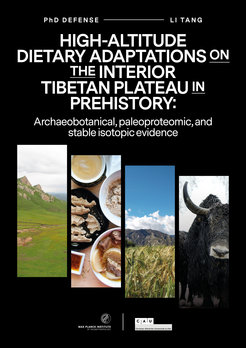Dr. Li Tang Honored with 2025 Johanna Mestorf Award

Dr. Li Tang has been honored with the Johanna Mestorf Award 2025 for her groundbreaking dissertation, “High-altitude dietary adaptations on the interior Tibetan Plateau in prehistory: Archaeobotanical, paleoproteomic, and stable isotopic evidence,” completed jointly at the Max Planck Institute of Geoanthropology and Kiel University. Presented by the Johanna Mestorf Academy, the award honors young researchers who have written an excellent dissertation exploring human-environment interactions. The accolade was formally conferred during a ceremony in Kiel on March 24, 2025.
Dr. Tang’s work investigates how earlier human communities on the Tibetan Plateau responded to environmental challenges by switching to a new agropastoral system. She analyzed diverse materials from 39 sites across the interior plateau using three methods: archaeobotany, paleoproteomics, and stable isotope analysis. Her thesis has generated, to date, the largest paleoeconomic dataset in the region. Her research not only identified the region’s earliest barley-based farming and dairy consumption, but also, for the first time, systematically mapped out the diverse dietary adaptations within four subregions of the interior plateau, challenging the existing uniform subsistence models for Tibet.

“This excellent and superbly written work shows a strong scientific and archaeological context and demonstrates how different disciplines can be successfully integrated within archaeology,” emphasised Prof. Dr Martin Furholt, Vice Spokesperson of the ROOTS Cluster of Excellence at Kiel University, in his laudatory speech.
“I am excited to receive the Johanna Mestorf Award for this year. This honor validates the importance of my dissertation in unravelling the complexities of human responses to diverse high-altitude landscapes across the Tibetan Plateau,” said Dr. Tang during the award ceremony. “It also motivates me to delve deeper into the co-development of human societies and the environment during the appearance and intensification of the new agropastoral system in the region.”
“I am eager to further explore ancient diets, diseases, and social interactions in Tibet and beyond, hoping that insights from past societies will shed light on current and future challenges related to extreme environments, climate change, and human impacts worldwide,” she added.













